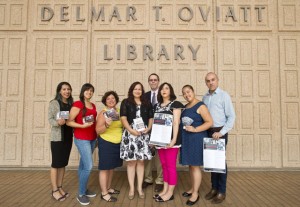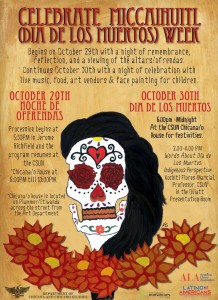
CSUN Fellows Share Research at Fourth Annual Colloquium
CSUN Event to Explore How Art Transforms Communities

 California State University, Northridge Chicana/o studies professor Denise M. Sandoval and independent filmmaker John Cantú will explore how the arts transform a community during a special screening of their documentary, “Rushing Waters, Rising Dreams,” and discussion of their book of the same name at CSUN on March 6.
California State University, Northridge Chicana/o studies professor Denise M. Sandoval and independent filmmaker John Cantú will explore how the arts transform a community during a special screening of their documentary, “Rushing Waters, Rising Dreams,” and discussion of their book of the same name at CSUN on March 6.
The event will take place at 2 p.m. in the Ferman Presentation Room in the Delmar T. Oviatt Library, located in the center of the campus at 18111 Nordhoff St. in Northridge.
“What makes this story so unique is that it is distinctive to the San Fernando Valley,” said Bernice Haber, a Friends of the Library board member. “Attendees will gain knowledge of what goes on in the San Fernado Valley, specifically the northeast valley, and the bookstore Tia Chucha’s, and what that community is trying to accomplish.”
The northeast San Fernando Valley of Los Angeles is the second largest community of Mexicans and Central Americans in the United States. The book explores 20 years of how the lack of neighborhood cultural spaces adversely affected struggling families and communities, and how the example of Tia Chucha’s inspires a cultural awakening and a revival of the economy and community spirit. The book speaks to a need for a national arts policy of cultural spaces, arts education, independent bookstores, public art projects and more.
The event is free and open to the public. For more information on the event, please call (818) 677-2638.
CSUN Panel to Discuss the Evolution of Digital Information
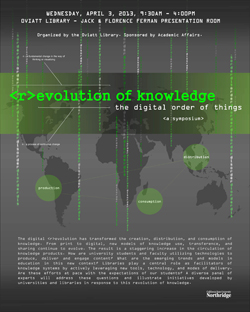
A diverse panel of experts on the creation, distribution and consumption of digital information will participate in a symposium at California State University, Northridge on Wednesday, April 3.
 The event, which is hosted by the Delmar T. Oviatt Library and Academic Affairs, will take place from 9:30 a.m. to 4 p.m. in the Jack and Florence Ferman Presentation Room of the Delmar T. Oviatt Library. The symposium, entitled “<R>Evolution of Knowledge: The Digital Order of Things,” will address several issues, including how university students and faculty utilize technology to produce, deliver and engage content; the emerging trends and models in education in the new digital age; and the role of libraries in meeting the expectations of students in light of constant technological changes.
The event, which is hosted by the Delmar T. Oviatt Library and Academic Affairs, will take place from 9:30 a.m. to 4 p.m. in the Jack and Florence Ferman Presentation Room of the Delmar T. Oviatt Library. The symposium, entitled “<R>Evolution of Knowledge: The Digital Order of Things,” will address several issues, including how university students and faculty utilize technology to produce, deliver and engage content; the emerging trends and models in education in the new digital age; and the role of libraries in meeting the expectations of students in light of constant technological changes.
“Production, publication, delivery and consumption of information, and in a deeper sense, knowledge, are quite often explored separately, or in a subset,” said Helen Heinrich, CSUN faculty/librarian and chair of the symposium organizing committee. “The symposium will bring these facets together as the links of one supply chain, reflecting on the role of universities and libraries. It will trace the evolution of these processes in light of new technologies, will assess our progress, identify challenges, and chart future opportunities.”
CSUN President Dianne F. Harrison, Provost Harry Hellenbrand and Oviatt Library Dean Mark Stover will be among those scheduled to address attendees. Guest speakers include Marshall Breeding, a consultant, author and creator of “Library Technology Guides”; Stephen Abram, managing principal at Lighthouse Partners and affiliate of Dysart and Jones Associates; Jeff Gold, director of Academic Technology at the CSU Chancellor’s Office; Deone Zell, senior director of Academic Technology at CSUN and Chrysanne Lowe, vice president of Global Marketing Communications at Elsevier.
The event will include lunch. RSVP by March 28 to mickey.martinez@csun.edu. For more information, call (818) 677-2271.
Think CSUN: The Library of the Future

Given the growth of digital information and personal technology, what will libraries look like twenty years from now? Mark Stover, dean of the Delmar T. Oviatt Library at California State University, Northridge, envisions the role of the library not contracting, but rather expanding to meet the unique needs of scholars and the surrounding community.
Produced by University Advancement, the “Think CSUN” video series features faculty experts at Cal State Northridge. We asked these campus thought leaders to speak clearly, candidly and off-the-cuff on contemporary issues in their fields of expertise.
Chinese Ambassador Jian Liu to Visit CSUN to Mark Donation to Library
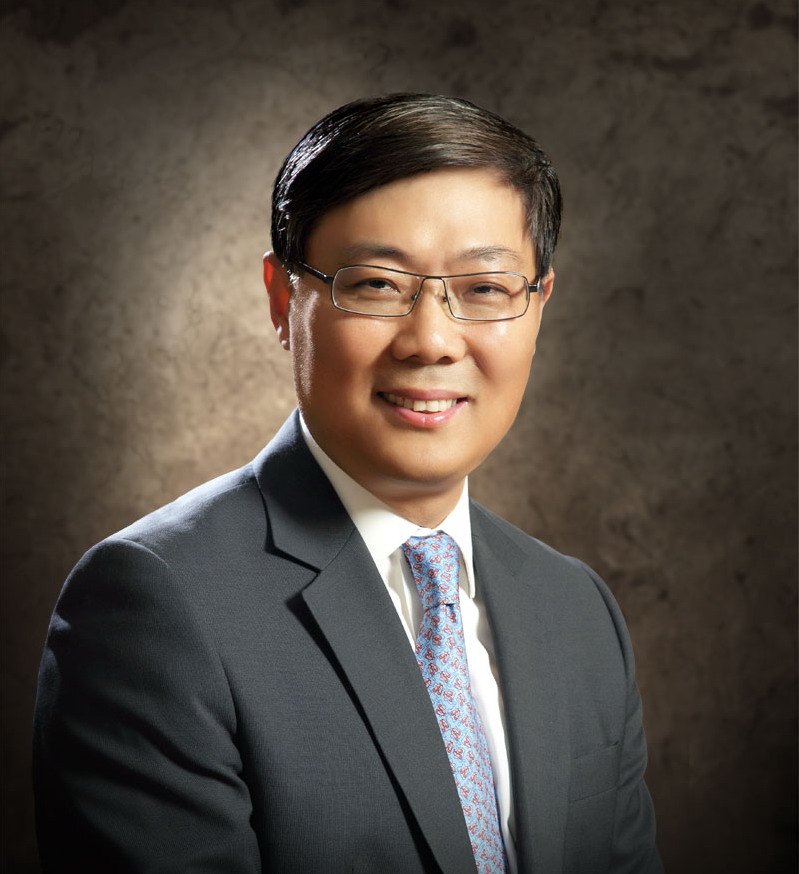
Ambassador Jian Liu, China’s consul-general for Los Angeles, is bringing a delegation to California State University, Northridge, on Wednesday, Dec. 11, to mark the donation of more than 2,000 books to the university’s library to expand student and faculty understanding of China.
Liu and China’s Consuls for Educational Affairs Wieheng Chen and Liqun Li will join CSUN President Dianne F. Harrison for a special ceremony at noon in the Jack and Florence Ferman Presentation Room of CSUN’s Delmar T. Oviatt Library, located at 18111 Nordhoff St. in Northridge.
“CSUN has a very long history of relationships with China,” said Harrison,
who visited China in September to meet with sister campus officials and members of CSUN’s China-based alumni networks. “We treasure those bonds, and we appreciate the generosity of the Chinese government in this valuable educational gift, which we will also share with our local schools that teach Chinese language and culture.”
Liu has spent more than 30 years as a career diplomat, serving in strategic appointments around the world, including as China’s ambassador in Pakistan, Malaysia and Afghanistan. He was appointed China’s consul-general for Los Angeles earlier this year.
Cal State Northridge has a long history of collaboration with China. CSUN was one of the first American universities to pursue educational and cultural exchanges with Chinese universities when the late-President James Cleary signed CSUN’s first foreign student exchange agreement in 1981. A year later, CSUN established its China Institute to promote a better understanding of the Chinese culture and to strengthen friendship between the American and Chinese people.
Today, CSUN has MOUs and letters of intent with about 50 universities in China. These agreements have helped to promote the academic and cultural exchange of faculty and students through joint teaching, research, creative projects, visiting professor opportunities and other projects. Hundreds of students from China have studied at CSUN, and faculty have participated in exchange programs.
Several years ago, the Chinese consulate donated more than 1,000 Chinese language and culture books to the Oviatt Library as a resource for CSUN students and members of the community to learn more about China and its people.
Mark Stover, dean of the Oviatt Library, said the most recent donation of books covers a wide range of topics, from language acquisition to the history and culture of China.
“The donation means a lot to us because we realize and recognize that China is opening up more and more, and many of our students are from mainland China,” Stover said. “It’s also important for a graduate of CSUN to understand Chinese culture, history and language. Plus, the Oviatt Library is a valuable resource, not just for the San Fernando Valley, but all of Southern California, and this is a great opportunity for residents of the region to have access to information about China.”
CSUN Builds iPad App For ‘In Protest’ Exhibit
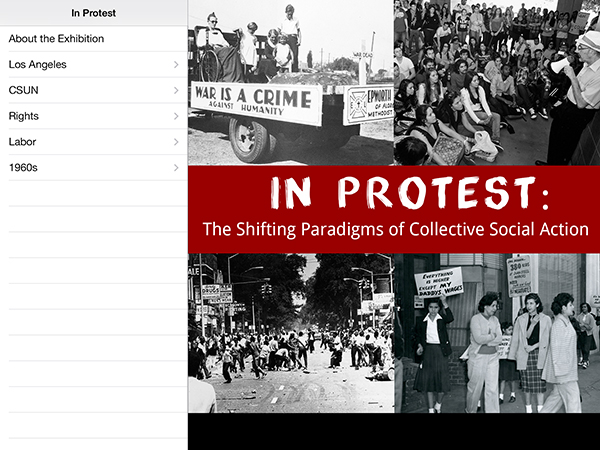
In the age of mobile computing, quick access to information is a key element in any situation. The staff at California State University, Northridge’s Delmar T. Oviatt Library has launched an iPad app for their “In Protest: The Shifting Paradigms of Collective Social Action” exhibition. It is the first in the library’s history, and complements the mobile push on campus seen in the release of the official CSUN app and the myCSUNTablet initiative, both of which were unveiled in the fall of 2013.
The “In Protest” app displays companion selections from CSUN’s Special Collections and Archives that document dozens of distinct and significant social action movements over the course of the 20th century, including the Zoot Suit Riots, anti-war protests and school walk-outs.
“The app gives visitors an opportunity to reflect on objects in the exhibition from an alternate perspective, adding another dimension to the significance of these items,” said Elizabeth Altman, interim director of library information for the Oviatt. “Items in the live exhibit are grouped by theme in 11 cases. The app presents selected items from across the exhibition in five alternative subject-based groupings — Los Angeles, CSUN, Rights, Labor, and the 1960s — and maps their placement on the live exhibit floor.”
Users of the app also have the option to share each captioned image on the social media sites Pinterest, Facebook and Twitter. Mark Stover, dean of the Oviatt Library, believes that this is an important step in developing exhibitions at CSUN, calling it “an important development for the Oviatt.”
The Oviatt Library is located in the heart of CSUN’s campus at 18111 Nordhoff St. in Northridge. Parking on campus is $6. The exhibit and its accompanying series of events are free and open to the public. “In Protest” is viewable during regular library hours.
For more information about the exhibition, please call (818) 677-2638, or visit the Exhibitions and Events page on the library’s website. Persons with disabilities needing assistance and deaf and hard-of-hearing persons needing interpreters, please call the above number in advance for arrangements.
Luiz Mendes Receives UCLA Department of Information Studies Distinguished Teaching Award for 2012-2013
CSUN Librarian Luiz Mendes was honored by students, faculty, and staff at UCLA’s Graduate School of Education & Information Studies Convocation on September 25, when he was awarded the UCLA Department of Information Studies Distinguished Teaching Award for 2012-2013. The award is given annually to an information studies faculty and acknowledges superior teaching performance. Luiz was recognized for his outstanding teaching and mentoring in the area of cataloging.
CSUN Awarded Grant to Preserve L.A. History and Train Future Librarians

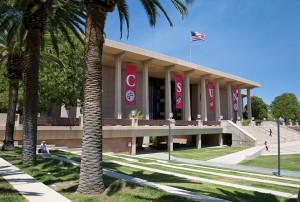
The Delmar T. Oviatt Library. Photo by Lee Choo.
The Delmar T. Oviatt Library at California State University, Northridge is part of a team of libraries across the Los Angeles area that have been awarded a grant to preserve the region’s history and to train future librarians.
As part of the grant from the Institute for Museum and Library Services (IMLS) Laura Bush 21st Century Librarian Program, the staff in the Oviatt Library will mentor two students as they work with representatives from the community-based archives to document the history and culture of Los Angeles. The IMLS Laura Bush 21st Century Librarian Program provides funds for training early-career librarians to manage emerging challenges in libraries and librarianship.
The Autry National Center Libraries and Archives and CSUN’s Oviatt Library partnered with the USC Libraries to develop the successful proposal and residency program.
Throughout the term of the grant, CSUN, USC and the Autry will host and mentor two residents, who in turn will work with community-based archives as well as the “L.A. as Subject” membership. Hosted by the USC Libraries, “L.A. as Subject” is comprised of 230 libraries, museums, archives, and private collections of valuable primary resources and other materials that document the history and culture of Los Angeles.
“No single institution can capture and preserve the stories that make up the totality of Los Angeles,” said Catherine Quinlan, dean of USC Libraries. “This generous support from the IMLS helps the USC Libraries and our partners ensure that the many collections of less-visible Los Angeles histories become sustainable resources for scholarship on Southern California, the American West and our city as a Pacific Rim metropolis.”
The library residents will help smaller organizations and individual collectors apply a high archival standard and practice to make certain their collections become and remain accessible to students, scholars and the global community of researchers studying the history and meaning of Los Angeles.
The $440,000 grant supports six residents over a period of three years. L.A. as Subject will issue a call for proposals from community archives and private collectors, and match residents with archives relating to their research interests.
For more information about the IMLS grants, policy development, research help libraries and museums, visit http://www.imls.gov.
For more information about the research alliance, “L.A. as Subject,” visit www.laassubject.org.
CSUN’s Oviatt Library Celebrates Banned Books

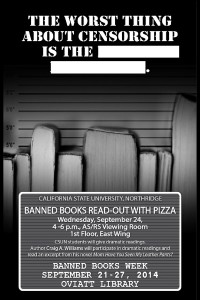 The Oviatt Library at California State University, Northridge will throw the spotlight on banned books with a reading of books some people would like to see taken off library shelves.
The Oviatt Library at California State University, Northridge will throw the spotlight on banned books with a reading of books some people would like to see taken off library shelves.
A read-out and pizza party will be held on Wednesday, Sept. 24, in observance of national Banned Book Week, which has been held annually since 1982 as a celebration of the freedom to read.
During the Sept. 24 event, CSUN students read from previously banned or challenged books. In addition, Craig A. Williams, author of “Mom Have You See My Leather Pants?” will read an excerpt from his novel.
By focusing on efforts across the country to remove or restrict access to books, Banned Books Week draws national attention to the harms of censorship.
According to the American Library Association, “Books have been and continue to be banned, but part of the Banned Books Week celebration is that regardless of whether or not the books have been banned, they have still remained available. This is only possible with the combined efforts of librarians, teachers, students and community members who stand up and speak out for the freedom to read.”
The read-out will be held in the Oviatt Library’s Automated Storage and Retrieval System viewing room on the first floor of the library’s east wing. This event is free and open to students, faculty, staff and the public.
The Oviatt Library is located at the center of the California State University, Northidge Campus at 18111 Nordhoff St. Parking is $6 and daily permits may be purchased at kiosks, information booths or in advance online at The Permit Store. For more information about all library events please visit the Exhibitions and Events page or call (818) 677-2638. The Oviatt Library serves as the main research facility in the San Fernando Valley.
CSUN Library Exhibit Spotlights the Golden State

The Delmar T. Oviatt Library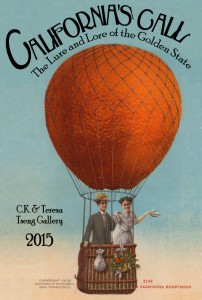 at California State University, Northridge is unveiling a new exhibit next month that explores the optimistic role that California has played in the American psyche.
at California State University, Northridge is unveiling a new exhibit next month that explores the optimistic role that California has played in the American psyche.
“California’s Call: The Lure of the Golden State,” includes a wide range of rare materials from the late 19th century that cohesively tell the story of a land out west, brimming with prosperity and promise. The exhibit officially opens on Feb. 2 and will be on display in the C.K. and Teresa Tseng Gallery in the east wing of the library’s second floor, through Dec. 23. “California’s Call: The Lure of the Golden State,” is free and open to the public.
“Almost all of the items in this exhibit came from the California Tourism and Promotional Literature Collection, which spans the years 1860-1990,” said Kelsey Knox, the exhibit’s curator and the Oviatt Library’s Los Angeles Archivist. “As someone who grew up in California, I had never given the lure of California much thought. To me, it was just home. I found it really interesting to look at all the materials that were created to draw people to California and to see how advertisers worked to make California such a popular destination.”
The exhibition includes pamphlets, posters, books and brochures. Also on display are journals and photo albums that convey unique and personal stories about the state and about many of the people who traveled to California in search of sunshine, health and good fortune.
The Oviatt Library is located in the heart of the university’s campus at 18111 Nordhoff St. in Northridge. Parking on campus is $6. For more information about the exhibit, please call (818) 677-2638, or visit the Exhibitions and Events page on the library website. Persons with disabilities needing assistance and deaf and hard-of-hearing persons needing interpreters can call the above number in advance for arrangements.
CSUN’s Oviatt Library has more than 1.4 million volumes. It also subscribes to nearly 53,000 online journals, more than 2,300 print journals, more than 200 online databases and nearly 275,000 eBooks. The library’s online resources are heavily used, with almost 13 million visits to its webpages and databases annually, and a yearly gate count of more than 1.6 million patrons. It also has an extensive collection of rare books, manuscripts, documents, photographs, artifacts and other archival materials. The Oviatt Library serves as the main research facility in the San Fernando Valley. For more information about the library or its hours, please visit it’s website at http://library.csun.edu/ or call (818) 677- 2285.
Awakening the Reader and Leader Within

“How does reading turn us into leaders?”
Mark Stover, dean of California State University, Northridge’s Delmar T. Oviatt Library, posed this question to the audience during his opening remarks for the second installment of the Read to Lead series on Feb. 24. Launched in November 2014, the program is a partnership between the library and CSUN Athletics to promote the value of reading. Enlisting the participation of leaders from across the campus, people can hear firsthand about how books have impacted those university notables’ leadership skills.
“Reading awakens, enlarges, enhances and refines our humanity in a way that almost nothing else can,” Stover said. His words helped set the tone for the second Read to Lead session.
Like the first event, there were four presenters who are leaders on campus. This time, the participants were: Dean of the Michael D. Eisner College of Education Michael Spagna, Valley Performing Arts Center Executive Director Thor Steingraber, CSUN Women’s Golf Head Coach Gina Umeck and Associate Vice President of Financial Services Deborah Wallace. Reprising her role from the first event was Lynn Lampert, the associate dean of the library. These leaders all shared insights into how their chosen books impacted them.
Spagna talked about The Mismeasure of Man by Stephen Jay Gould, noting that he felt the book actually “found” him. The dean shared a story from his graduate school days at the University of California, Berkeley, recalling a time when he heard a woman weeping in a hallway. When she had composed herself, the woman shared that her son had been described using a derogatory term because he’d been diagnosed with special needs. Spagna said the encounter inspired him to read the book, which solidified his awareness of how terminology impacts people and their perceptions.
“This book is all about the misapplication of labels,” Spagna said. “In our work as leaders at the university, this happens all the time. I challenge myself every day to not fall into the human habit of categorizing people. In my career, this book is meaningful as a watershed, to think about that difference every day and celebrate that difference.”
Wallace chose the book The Effective Executive by Peter Drucker, which she first came across early in her college days. Wallace pointed out that the edition she has is not the original one she purchased, as that one had become so tattered and worn that it had to be replaced.
One of the great lessons she learned from the book emphasized not doing so many different things, but “the right thing,” Wallace said. She pointed out that working with finance, the days for her and her staff can become very “transactional” in nature. Drucker notes the importance of keeping one’s priorities top of mind, she said.
“Sometimes we lose that real insight, the real reason why we’re here. We’re here to serve students,” Wallace said. “I have to remind my staff, ‘We all get caught up in the small things. As the saying goes, we don’t sweat the petty things, and we don’t pet the sweaty things.’
“Drucker encourages that. He said to write down a plan, and how you will accomplish that plan. That’s being an effective leader.”
Steingraber chose the book House of Stone by Anthony Shadid, which chronicles the author’s move to Lebanon to claim his ancestral home that had been his great-grandmother’s. Shadid, a journalist who would later die while on assignment in Syria, shared how he overcame the difficulties of moving to the Middle East.
“His moving back to Lebanon was not to the Lebanon of his great-grandmother,” Steingraber said. “His moving back was not to a place where he’s accepted as an insider — he’s now a Westerner. Everything about trying to accomplish that very simple thing, reclaiming his ancestral home in the face of everybody’s opposition, really spoke to me as a leader.”
Umeck made the unique choice of the poem If by Rudyard Kipling, and she quickly pointed out that the famous work became her personal “constitution.” She quoted the stanza:
If you can talk with crowds and keep your virtue,
Or walk with Kings — nor lose the common touch.
The golf coach pointed out that those words related to her profession because in coaching, she has to deal with student-athletes from different backgrounds. She added that some of the leaders she most admired displayed a “stoic cynicism,” and sought to display this quality as well. Umeck said there was something else she learned from Kipling’s prose.
“Life’s going to take us a long way,” Umeck said. “You’re going up and going down. This poem forces you to look from above, and that’s something, more and more, I try to do.”
CSUN Director of Intercollegiate Athletics Brandon Martin closed the proceedings by relating the importance of reading to his young children, ages 5 and 2.
“As we read these children’s books, it’s not just about reading the books,” Martin said. “It’s about what dreams emerge, what values emerge.
“It’s that obligation that I have to give my kids. It’s impactful.”
Martin said the next Read to Lead session will take place in the fall in The Matadome, and it will feature Men’s Basketball Coach Reggie Theus as one of the speakers. Martin went on to quote the famous writer Aldous Huxley: “Every man who knows how to read, has it in his power to magnify himself, to multiply the ways in which he exists, to make his life full, significant and interesting.”
Martin added, “The questions that I pose to you all are, how do we magnify ourselves to advance the mission of CSUN? How do we multiply our knowledge to better serve our students and the campus community? How do we use reading to enrich our lives with more meaning, purpose and substance?
“We’ve learned about the power of it. It’s our job to seek comprehensive excellence in all aspects of our lives.”
Uncovering Hidden Teaching Treasures of the CSUN Oviatt Library

The mission of California State University Northridge’s Delmar T. Oviatt Library is to support the diverse information needs of CSUN’s academic community through the delivery of relevant library resources and services. With students, faculty and staff flowing through at all hours of the day, the Oviatt is hardly hidden to the community.
However, covertly located on the garden level of the Oviatt Library, the Teacher Curriculum Center (TCC) is home to the K-12 curriculum materials library for CSUN. It serves as a resource for instructional materials to students, faculty and community educators.
“By providing resources that help lay out and create lesson plans for use in the K-12 classroom, such as teacher-edition textbooks and curriculum guides, the TCC collection directly benefits its users by allowing them to borrow materials for short-term use that they might otherwise have to purchase themselves,” said Mara Houdyshell, director of the Teacher Curriculum Center.
The development of critical thinking and research skills are crucial components that will prepare students for lifelong success in the digital age. Partnerships with CSUN faculty and staff in the education of students enhance the availability of supplemental resources that incorporate hands-on learning for children who are visual learners.
The TCC specializes in providing access to both print and non-print materials that are used within elementary and secondary school settings. Exemplifying CSUN’s commitment to diversity, the center accommodates those who are visually impaired by providing the entire collection of J.K. Rowling’s “Harry Potter” series in Braille.
The English-language arts and development resources, along with the math and science resources, are closely monitored by the center’s staff to ensure it has approved and credible resources for students, faculty and the community alike.
“We strive to meet the needs of our student teachers, working with local schools,” said Gabriel Castañeda, the TCC’s supervisor. “For example, the Common Core standards have been recently implemented. Our librarian is ordering new textbooks with that in mind.”
Oviatt staff work closely with local schools to make sure the TCC has the approved and adopted materials that they are currently using. These course materials, such as the latest editions of “California Treasures and Contemporary Classics” textbooks, are resources that include vocabulary lists, lecture outlines that focus on literary themes and motifs, as well as worksheets to accompany and reinforce the lesson plans.
Course materials are also available in various languages including Spanish, German and Japanese.
The center aspires to provide students, faculty and staff with authentic reproductions of approved teaching materials, and to make these materials available to the San Fernando Valley community. For a $25 monthly fee, anyone can become a TCC member. As a community user one has complete access to everything the TCC has to offer. This is an ideal method to access materials for local student-teachers and those who homeschool their children. The resources are available for all users to check out and even take home. Undergraduate students have a two-week checkout period while graduate students have a four-week rental period.
The checkout access includes — but is not limited to — games and hands-on materials available within the center. Puppets, board games for all ages and hula-hoops are just a few of the items available from the center.
Aside from having staff readily available to help patrons find supplemental items to assist them, the center has begun to increase its on-campus visibility by creating a “road show,” or an in-classroom overview of what the TCC has to offer. For more information about the TCC, please visit http://library.csun.edu/Collections/TCC.
The Oviatt Library is home to Northridge’s academic community, delivering credible library resources to support teaching and learning for CSUN faculty and students alike. The Oviatt Library serves as the main research facility in the San Fernando Valley.
The library is located at the center of the CSUN campus at 18111 Nordhoff Street. Parking is $6, and daily permits may be purchased at kiosks, information booths or in advance online at The Permit Store at https://www.thepermitstore.com/csun/event/. For more information about all library events please visit the Exhibitions and Events at http://library.csun.edu/events or call (818) 677-2638.
‘Arousal,’‘Climax’ and the Afterglow in CSUN’s Oviatt Library

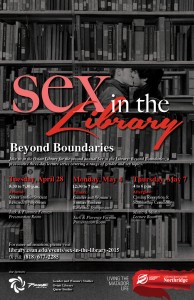 The Oviatt Library at California State University, Northridge will once again partner with CSUN’s gender and women’s studies department, queer studies program, and Pride Center to present their second annual “Sex in the Library” series of lectures and presentations.
The Oviatt Library at California State University, Northridge will once again partner with CSUN’s gender and women’s studies department, queer studies program, and Pride Center to present their second annual “Sex in the Library” series of lectures and presentations.
“Sex in the Library: Beyond Boundaries” will kick off on Tuesday, April 28, with “The Arousal: Queer Studies Student Research Symposium,” from 5:30 p.m. to 7:30 p.m., in the Jack and Florence Ferman Presentation Room located on the garden level in the Oviatt Library. This first event in the series will feature student research presentations from the Queer Studies program.
“Students have been specifically challenged to use the archival materials held in the Vern and Bonnie Bullough Collection on Sex and Gender to inform their research,” said Gregory Knotts, coordinator of the Queer Studies program.
On Monday, May 4, the Department of Gender and Women’s Studies will present “The Climax: Gender and Women’s Studies Student Research Symposium,” also in the Library’s Jack and Florence Ferman Presentation Room. This daylong program will include three panels of student research project presentations.
In addition to the panels, keynote speaker Tiffany Willoughby-Heard from the University of California, Irvine, will present “People of the Body vs. People of the Mind and the work of Gargi Bhattacharyya.” The keynote address by Willoughby-Heard will begin at 2:00 p.m., and, like all events in this series, is open to students, staff, faculty and the public.
“Sex in the Library: Beyond Boundaries,” will culminate on Thursday, May 7, in the library’s newly remodeled Music and Media Lecture Room, with “The Afterglow: Closing Reception & Scholarship Ceremony,” from 4:00 p.m. to 6:00 pm.
The closing reception, co-hosted by the Oviatt Library and the Pride Center, will feature a keynote address by Andy Sacher, founding executive and creative director of “The Lavender Effect.”
In addition, two students, one from queer studies and one from gender and women’s studies, will be presented with Vern and Bonnie Bullough Endowment Student Research Awards. The selection of these scholarships is based on the students’ successful integration of archival research into their capstone projects. Funding for these scholarships is provided by the Vern and Bonnie Bullough Endowment, which was also the catalyst for the creation of this series of events. The primary objective of the Bullough Endowment is to support programs and exhibitions featuring speakers on the topics of human sexuality and gender issues.
A detailed schedule of all “Sex in the Library: Beyond Boundaries” programing can be found on the Exhibitions and Events page on the Oviatt Library website at http://library.csun.edu/blogs/goingson, or by calling (818) 677-2638.
The Oviatt Library is located at the center of the California State University, Northridge campus at 18111 Nordhoff St. Parking is $6.00 and daily parking permits may be purchased at booths or online at www.thepermitstore.com/csun/event/. The Oviatt Library serves as the main research facility in the San Fernando Valley. For more information about the Library or its hours please visit their website at http://library.csun.edu/ or call (818) 677- 2285.
Search on for CSUN’s Inaugural San Fernando Valley Award for Nonfiction

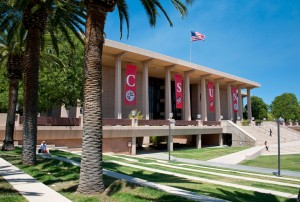
The Oviatt Library
The Friends of the Oviatt Library at California State University, Northridge is putting out a call for submissions for its inaugural San Fernando Valley Award for Nonfiction.
The new honor was created to recognize the important contributions to nonfiction writing about the San Fernando Valley, and to promote research and writing related to the region.
“The San Fernando Valley, with a population of almost 2 million people, has a colorful history and bright future,” said Mark Stover, dean of CSUN’s Delmar T. Oviatt Library. “The Valley has played an important role in the evolution of the City of Los Angeles and the surrounding region for many years.
“Growth in the population, in industry and in the arts and culture make the Valley a rich source of material for nonfiction literature, including fields like history, journalism, the social and behavioral sciences, physical and life sciences, the arts, and biography,” he continued. “There are no other awards for books written specifically about the San Fernando Valley, so it makes perfect sense for the Oviatt Library at California State University, Northridge — the largest university in the region — to honor writers and researchers with this prize.”
Authors, publishers or any member of the public may submit entries for the award. All entries must be received no later than Dec. 1, 2015. Submissions must be original, nonfiction publications in book format. (E-books are eligible, but check the website below for details.) Acceptable subject categories include history, the social and behavioral sciences, physical and life sciences, biography and autobiography, and nonfiction works dealing with the humanities. The subject of the works must be related directly to the San Fernando Valley.
An award of at least $750 will be given to a writer who has produced a significant work of nonfiction dealing directly with the San Fernando Valley region. In addition, an honorable mention award of $250 also may be presented if warranted. If no honorable mention is given, the main award will be in the amount of $1.000.
For additional information about the San Fernando Valley Award for Nonfiction, for complete guidelines or to request a submission application, call (818) 677-2638 or visit the Friends of the Library website.
The Oviatt Library is located at the center of the CSUN campus at 18111 Nordhoff St. in Northridge. The library serves as the main research facility in the San Fernando Valley. For more information about the library or its hours, visit its website or call (818) 677-2285.
Matador Alumni Return for Summer Movie Night

California State University, Northridge alumni and their friends and families flocked back to campus to watch the recent animated smash Big Hero 6 on July 16 on the Oviatt Library lawn. The event, organized by the Alumni Association and Associated Students, included food trucks, games and the outdoor movie. Moviegoers brought their lawn chairs and picnic blankets to lounge with their fellow Matadors to enjoy the annual Summer Movie Fest. The Movie Fest continues each Thursday evening through Aug. 27. For additional information, visit http://www.csun.edu/as/summer-movie-fest.
CSUN’s Oviatt Library Receives Grant to Promote Local Latino/a History
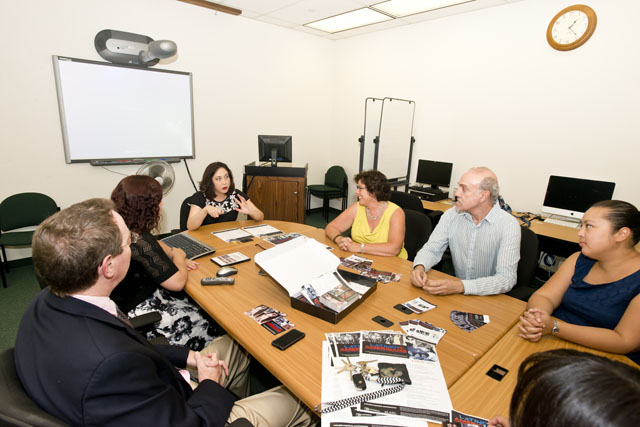
Through a joint grant from the American Library Association and the National Endowment for the Humanities, the California State University, Northridge’s Delmar T. Oviatt Library will host a program that works with local Latino/a community centers to synthesize classroom and community experiences into one program — to paint a broader picture of Latino American history.
Grant coordinators Jennie Quinonez-Skinner, Luiz Mendes, and Isis Leininger are heading the yearlong project, which will be focused on delving deeper into topics highlighted in a PBS documentary series titled “Latino Americans: 500 Years of History.”
“We are showcasing the six segments of this documentary,” she said. “It really helps bring about the richness of the Latino history in the U.S.”
The project will explore various aspects of Latino American history, such as their influence in the Hollywood film industry, veterans of foreign wars and public art projects in the San Fernando Valley.
Quinonez-Skinner explained that the wide variety of topics the documentary series covers gave her department a chance to bring in other groups — such as the CSUN Veterans Resource Center, the library’s Creative Media Studio and local public entities — for an opportunity to work together on telling the history of Latino Americans from a more personal perspective.
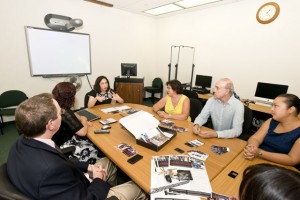
Grant coordinator Jennie Quinonez-Skinner, center, discusses the upcoming events for the year-long project on “Latino Americans: 500 Years of History,” with team members in the library. Photo by David J. Hawkins.
“We have a huge amount of diversity in the U.S.,” she said. “It is important to encourage Latino Americans to share their stories in different ways.”
Mendes is reaching out to local libraries and community centers for the program. He said he is inspired by these collaborations because they provide a different approach to learning.
“One of the things we wanted to focus on is the partnership between the academic institution and the local cultural heritage,” he said. “We can design programs and activities that will educate [the community] about Latino Americans, their culture, their history — while going beyond the traditional walls of the academic institution.”
Fellow team member Veronica Muncal described the program as a path for other cultures in the region to be discussed.
“CSUN is such a diverse campus — that is one of the things that made me excited for this,” Muncal said. “I see this as a door opening for other cultures as well. I am Filipino, and I have a place in the Latino community [in Los Angeles]. It’s interesting to see a wider view of Latino history here.”
Quinonez-Skinner said she believes the program will provide a more open story of Latino American history.
“For a lot of us, no matter our backgrounds, we hear the singular story of a culture,” she said. “There is so much more. We want to make some great connections, provide more access to these scholarly topics to a wider audience and see ourselves in another light.”
“Latino Americans: 500 Years of History,” will be shown in six segments. Showings begin on Sept. 16 and end on April 2, 2016. For information on locations and times of showings and events, visit library.csun.edu/latino-americans.
CSUN Honors Día de los Muertos with Two-Day Celebration

Halloween is approaching, and with it the commercially misunderstood Mexican holiday Día de los Muertos. Face painting and death-themed festivities show similarities to the European-based Halloween, but Día de los Muertos revolves around the appreciation of life and dead loved ones.
“It is important to understand that it is not Halloween,” said Lara Medina, professor of Chicana/o Studies. “It’s an ancient tradition that’s adapting to modern times.”
The California State University, Northridge Department of Chicana/o Studies — in cooperation with Medina and professor Yreina Cervantez — will host a two-day celebration, Miccaihuitl, in honor of Día de los Muertos, Oct. 29–30. The events will be primarily hosted at the Chicana/o House, located on Plummer Street, across from the Department of Art building.
“The tradition is about the annual time to remember, honor and commune with our loved ones who have passed on,” Medina said. “It’s a very spiritual time to connect again with our dead.”
On Thursday, Oct. 29, guests are invited to participate in the Noche de Ofrendas (Night of Offering) procession starting at 5:30 p.m. at Jerome Richfield Hall, culminating at the CSUN Chicana/o House at 6 p.m. At the procession, participants are encouraged to exchange stories of deceased loved ones and share food and flower offerings.
“We will also have a community altar, and people can add to it,” Medina said.
At 6 p.m. on Friday, Oct. 30, the Chicana/o House will host Día de los Muertos festivities with live music, food and art vendors. CSUN students will present information about the Día de los Muertos tradition, arts and crafts, and face painting for children.
“Friday will be more of a festival event,” Medina said. “It will be more music and performance.”
Also on the 30th, CSUN’s Delmar T. Oviatt Library is collaborating with the San Fernando Public Library to host a program with professor Xochitl Flores-Marcial, who will speak on “Words about Día de Los Muertos: Indigenous Perspectives.” The program will take place from 2 to 4 p.m. in the Oviatt Library’s Ferman Presentation Room.
Earlier in the month, Flores-Marcial offered a workshop, “How to Make Papel Picado,” in honor of the holiday, at the San Fernando Public Library.
All CSUN Miccaihuitl events are open to the public and those who are interested in honoring the dead with joy and respect. “It’s a time when the veil between the physical world and the spiritual world is lifted,” Medina said. “So the spirits are able to return and enjoy all of the bounty we have laid out for them.”
CSUN Hosts Book Talk on the Struggles of Islamic Activist Group’s Fight for Gender Equality
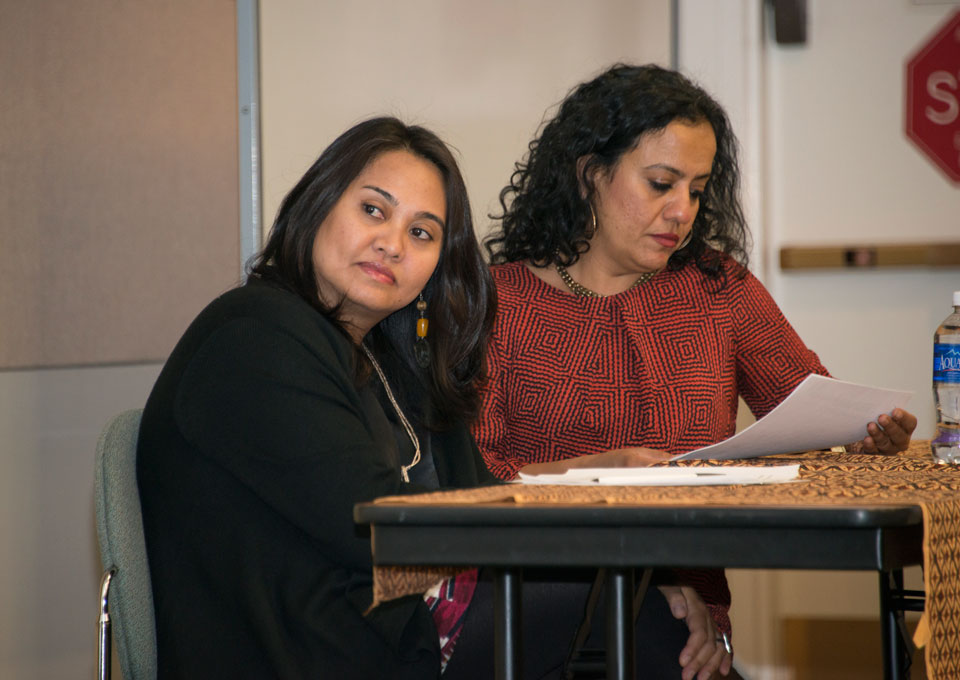
California State University, Northridge’s Department of Gender and Women’s Studies hosted a book talk Nov. 17 on gender equality in Muslim communities in Southeast Asia.
The event took place at the Delmar T. Oviatt Library and was organized by the Middle East and Islamic Studies (MEIS) program and co-sponsored by CSUN’s Department of Gender and Women’s Studies. The talk featured guest speaker and author Azza Basarudin, a scholar-activist with a Ph.D. in women’s studies from UCLA.
In her book Humanizing the Sacred: Sisters in Islam and the Struggle for Gender Justice in Malaysia, Basarudin examines the work and challenges of the nongovernmental organization Sisters in Islam (SIS), a group of feminist advocates working in Malaysia.
“They tell people that there’s not just one way to life,” Basarudin said. “I wanted to understand the work they did.”
SIS was founded by a group of educated Malaysian Muslim women-activists challenging institutionalized Islamic authority and trying to reform laws in Malaysia.
According to Basarudin, SIS works to establish a sacred constitution that embraces gender justice and equality, rather than following the rules of the State.
“They became very well known after 9/11,” Basarudin said, adding that many Western countries have offered to help fund SIS.
“But they have rejected much the funding that was offered to them [because] they don’t need that additional stigma attached to them, of having foreign donors,” Basarudin said. “They are very careful about where their funding comes from.”
Khanum Shaikh, a professor in Women’s Studies, organized the event and invited all CSUN students — particularly students in the Women’s Studies and Middle East and Islamic Studies programs — to attend and learn about Basarudin’s ethnographic study of Muslim female activists.
Shaikh has known Basarudin for several years and invited her to CSUN shortly after the activist’s book was published.
“We went to UCLA together and got our Ph.D.s together in Gender and Women’s Studies,” Shaikh said.
Too many people have adopted a one-sided perception of Islam and Muslims due to perpetual media coverage of groups like ISIS and the Taliban, which makes it important to raise awareness about groups and individuals who are fighting to push for a different path, the professor said.
“The only information about Islam and Muslim communities revolves around terrorism and Islamic fundamentalism right now,” Shaikh said. “But it is really important to see that there is so much activism happening from within Muslim communities that is fighting any regressive interpretation of Islam.”
Affordable Learning Solutions Initiative Tries to Lower Cost for Course Materials
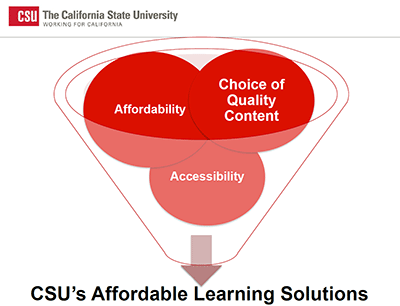
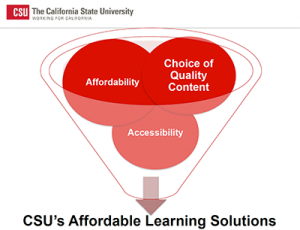
The three basics of the AL$ program are affordability, accessibility and choice of quality content. Image credit: Gerry Hanley.
The rising cost of tuition and textbooks have significantly impacted students’ learning behavior. In 2014, the independent student organization Student Public Interest Research Groups (PIRG) found that 65 percent of college students in the United States do not purchase course-required textbooks due to the expense. The consequences are unprepared students, bad grades and frustration within the classroom.
“When faculty choose textbooks, the last thing they think about is cost,” said Laurie Borchard, a librarian at California State University, Northridge’s Delmar T. Oviatt Library. “They take into to account if [the books] have been used before, if they are well known in the field and how effective they are. That makes sense, but a lot of courses have textbooks ranging anywhere between $50–150. And then you don’t get a lot of money to resell them.”
California State University campuses have advocated for the initiative for several years. The Chancellor’s Office grants up to $20,000 to different CSUs each year to promote affordable learning solutions. In spring 2015, Borchard applied for the AL$ grant for CSUN.
Borchard is the coordinator of the Affordable Learning Solutions (AL$) initiative at CSUN. She recently published the article Combating the Rising Cost of Education, which introduced the initiative to CSUN.
“The great thing about open educational resources and initiatives like this is the focus on adapting resources that already exist and are open and free to use, as well as utilizing library resources,” said Borchard.
The AL$ initiative cooperates with the Department of Academic Technology, the Faculty Technology Center, the Matador Bookstore and the Oviatt Library, helping students and faculty select free or affordable quality resources.
“The bookstore is centrally committed to maximizing student access to the materials needed for success,” said Amy Berger, director of the Matador Bookstore. “Price can be a major barrier for some students, so we strive to offer a wide range of affordable options.”
According to Berger, many students make use of the textbook rentals at the bookstore, which can save them up to 80 percent of the textbook costs. Therefore, the bookstore constantly tries to expand the inventory for the course textbooks at CSUN.
Berger also encourages faculty to explore alternatives on the internal online adoption tool, which provides quick access to low and no-cost course materials, such as YouTube videos, open educational resources (OER) and massive open online course (MOOC) content.
“The bookstore will continue to partner with faculty in exploring affordable course materials options,” Berger said. “Students will have more choices and affordable options to ensure they have access to what they need to succeed.”
Courses that use print textbooks can be redesigned for Moodle classes, including images, texts, tutorials and a combination of other digital learning materials. A redesign takes time, but will be financially covered.
“I think of that as being a more engaging and effective way of learning, because it covers different learning styles,” Borchard said.
But courses don’t necessarily have to be completely redesigned to be more affordable to students. The AL$ initiative also helps faculty create new texts or find new open sources, depending on their needs and course requirements.
“It definitely takes time and investment, but if you are able to talk with the people who have already done it, they all have really positive things to say about it,” Borchard said. “They all talk about how their students are prepared and more engaged in the class. It creates a better environment for everyone.”
The affordable learning solutions consist of three criteria: affordability, accessibility and the quality of content. Affordability is determined by choosing material that’s either free or low cost, while all the materials are carefully evaluated to ensure they meet the needs of students and course requirements.
For accessibility, the initiative places importance on resources for students with disabilities.
“As we’re assisting faculty with finding and evaluating resources, part of that evaluation is making sure that they are accessible,” Borchard said.
Organizers are looking for faculty who want to experiment with redesigning their course, she said. She encouraged all faculty members to reach out and learn about different solutions and possibilities from the AL$ initiative and the available grants.
“Moving forward, we would really like to educate faculty on open education resources and making their classes more affordable,” Borchard said. “I remember what it was like to be a student. I didn’t always purchase my textbooks because I couldn’t afford them.”
After learning about the initiative in a workshop, Borchard said, she was inspired by the program and what other CSU campuses were doing. She learned about the positive impact on student outcomes.
“This is really something that benefits the students in a lot of different ways,” Borchard said. “It promotes the idea that information should be free and available to everyone, especially in higher education. College is expensive enough, and we shouldn’t have these extra barriers of having to worry about affording the materials.”
Faculty interested in participating in the AL$ initiative can contact Laurie Borchard at (818) 677-4264 or laurie.borchard@csun.edu. For more information, visit the Affordable Learning Solutions website.
Matadors Take a Finals Break With Furry Friends

Finals weeks is upon the close to 40,000 California State University, Northridge students who are finishing out the Spring 2015 semester. So to relieve a bit of pressure, the Delmar T. Oviatt Library put together a little stress relief in the form of therapy dogs. The library’s “Take a Study Break at the Oviatt During Finals Week,” allowed students studying for their finals a chance to share a hug with a furry, four-legged friend.
The dogs were placed in the Retrieval System Viewing Room, located on the library’s main floor, and there are a number of activities planned for all those involved. Besides the dogs there were arts and crafts, and board game sessions to give minds a few minutes off from their studying. Weary students who were just too tired to play with pooches could get a free pillow on which to rest their heads from Library Guest Services.
According to CNN, “Scientific studies do show that canine interaction increases a human’s level of oxytocin, a hormone that reduces anxiety and blood pressure. Petting a dog or caring for a pet helps people become less frightened, more secure and diverts their attention away from their own fears or anxieties.
“Studies also show excessive stress, like the kind students may experience during finals, impairs memory. An activity that relieves that stress even for a moment improves a student’s ability to retain what they are trying to learn.”

